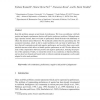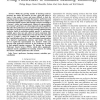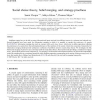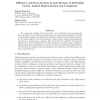136
Voted
JETAI
2010
15 years 1 months ago
2010
Real-life problems present several kinds of preferences. We focus on problems with both positive and negative preferences, that we call bipolar preference problems. Although seemi...
133
Voted
CORR
2002
Springer
15 years 2 months ago
2002
Springer
The aggregation of conflicting preferences is a central problem in multiagent systems. The key difficulty is that the agents may report their preferences insincerely. Mechanism de...
140
Voted
CI
2004
15 years 2 months ago
2004
This paper shows how action theories, expressed in an extended version of the language B, can be naturally encoded using Prioritized Default Theory. We also show how prioritized d...
110
Voted
CI
2004
15 years 2 months ago
2004
Although ceteris paribus preference statements concisely represent one natural class of preferences over outcomes or goals, many applications of such preferences require numeric u...
112
Voted
CI
2004
15 years 2 months ago
2004
We consider automated decision aids that help users select the best solution from a large set of options. For such tools to successfully accomplish their task, eliciting and repre...
102
click to vote
ANOR
2004
15 years 2 months ago
2004
Many real-world AI problems (e.g. in configuration) are weakly constrained, thus requiring a mechanism for characterizing and finding the preferred solutions. Preferencebased sear...
132
Voted
TLT
2008
15 years 2 months ago
2008
While the growing number of learning resources increases the choice for learners on how, what and when to learn, it also makes it more and more difficult to find the learning resou...
89
Voted
MSS
2008
IEEE
15 years 2 months ago
2008
IEEE
It is shown that preferences can be constructed from observed choice behavior in a way that is robust to indifferent selection (i.e., the agent is indifferent between two alternat...
110
Voted
INFFUS
2006
15 years 2 months ago
2006
Intelligent agents have to be able to merge informational inputs received from different sources in a coherent and rational way. Several proposals have been made for information m...
123
Voted
JAIR
2008
15 years 2 months ago
2008
We consider the problem of allocating fairly a set of indivisible goods among agents from the point of view of compact representation and computational complexity. We start by ass...




